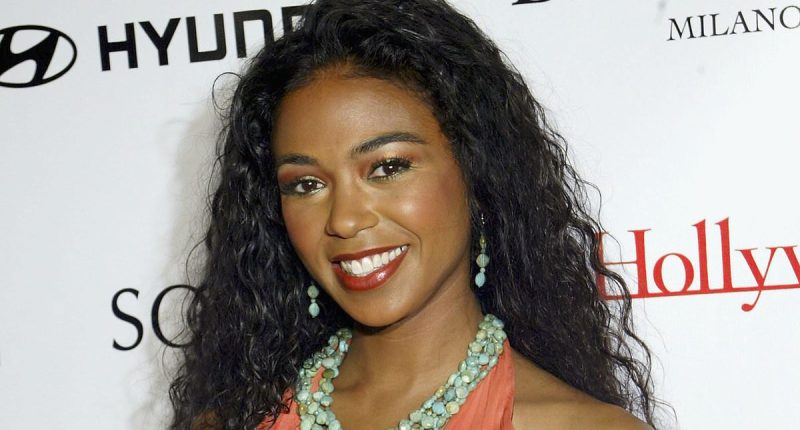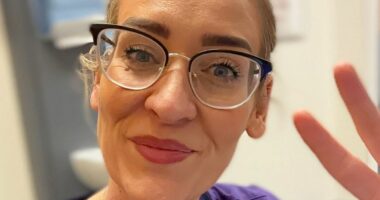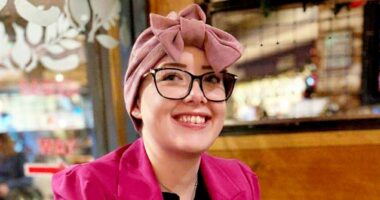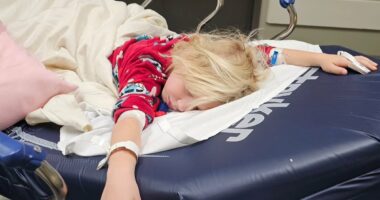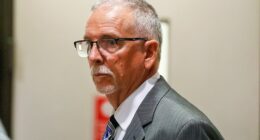Share this @internewscast.com
A Covid-era rule may have played a role in the tragic death of former MTV star Ananda Lewis who lost a six-year battle with breast cancer this week at age 52.
Lewis – who rose to fame as a video jockey for MTV – revealed last year that she was unable to get a mastectomy during lockdown in 2020 because California hospitals deemed it a non-emergency.
At that time, a rule emphasized using hospital space for Covid patients with severe illnesses instead of those needing ‘non-essential’ or ‘elective’ procedures.
Lewis’ was diagnosed in 2019 with stage three breast cancer. Authorities like the American Cancer Society believe removing breast tissue can prevent stage three illness from spreading further.
Instead of having a mastectomy at the time of diagnosis, she went down a path of alternative medicine and, after doing her own research, opted for high-dose vitamins and oxygen chambers, which are not proven to treat cancer.
Doctors told the Daily Mail they fear Covid-era lockdowns may have led to a ticking time bomb of cancers that were ignored or missed entirely, possibly leading patients to turn to unproven treatments.
A National Health Interview Survey from 2020 also revealed one in three cancer patients had disruptions in their care, such as delayed appointments, imaging, surgery or chemotherapy.
The survey also found 44% of breast cancer patients had treatment delays.
In 2020, according to research in JAMA Network Open, there were 17% fewer surgeries, 15% fewer chemotherapy sessions and 18% fewer radiation procedures due to pandemic lockdowns.

Former MTV VJ Ananda Lewis, pictured here, died this week at age 52 after a six-year battle with breast cancer. She reportedly shunned traditional treatments in favor of alternative medicine
After her diagnosis, Lewis admitted she had refused regular mammograms in the past over fears of radiation exposure. She said when she was initially diagnosed, she didn’t think she needed a double mastectomy, which involves surgically removing both breasts.
In 2020, she decided she would entertain the possibility of a double mastectomy. However, she couldn’t get one due to Covid restrictions.
In the years that followed, she did not try again to get one.
Instead, she traveled to Arizona in August 2020 to a facility offering treatments like acupuncture, cryoablation and apheresis, which involves filtering out blood to remove toxins.
Lewis later said she regretted her decisions and should have chosen surgery and traditional treatments instead.
She’s just one of a rising number of cancer patients who insisted upon ‘alternative remedies’ to rid themselves of the disease rather than modern medical advancements like chemotherapy, radiation and surgery.
In 2015, Australian wellness influencer Jessica Ainscough died at age 29 after six years of battling epithelioid sarcoma, an aggressive soft tissue cancer that develops in extremities like the hands and wrists.
Instead of having her arm amputated as doctors urged, she chose a controversial treatment called Gerson Therapy that involves coffee enemas, drinking raw juices and adopting a strict vegan diet based on conducting her own research and following advice from the Arizona clinic.
Her story went on to inspire the character of Milla Blake in Netflix hit show Apple Cider Vinegar, who suffers cancer and tries to cure it with the same treatments as Ainscough.
Cancer experts told the Daily Mail they are seeing a ‘concerning’ rise of patients using controversial treatments like these.
Their patients have cited concerns about harsh side effects of treatments like chemotherapy and radiation, maintaining a sense of control over their treatments and a growing distrust of the medical community following Covid.
Dr. Tiffany Troso-Sandoval, a medical oncologist in New York, referred to this shift toward ‘unproven alternative therapy’ as ‘unfortunate.’

Australian wellness influencer Jessica Ainscough, pictured here, died of cancer at age 29 in 2015. She adopted controversial treatments like coffee enemas and drinking raw juices
‘Thankfully, there are still only a very small percentage of people that will choose to forgo traditional cancer treatment altogether in lieu of alternative methods,’ she told the Daily Mail. ‘But the number of people who use holistic approaches in addition to standard treatment is very large and is growing.’
This includes those using marijuana, for example, to manage pain or nausea that results from cancer treatments like chemo.
‘Traditional medicine treatment of cancer is born out of decades of science and highly scrutinized clinical trials while many of the most popular alternatives are based upon anecdotal uses and word of mouth.’
Celebrity endorsements and social media could also be partly to blame, as well as the aformentioned post-pandemic mistrust of doctors, Dr. Troso-Sandoval said.
‘The rapid vaccine development and then the national mandates certainly contributed to the mistrust of our medical system,’ she explained.
A 2024 study published in JAMA Network Open found trust in physicians and hospitals in the US decreased from 71% in April 2020 to 40 percent in January 2024.
Vaccine mandates also led many Americans to view the healthcare system as coercive.
In January, for example, Mel Gibson went on Joe Rogan’s podcast claiming three of his friends with stage four cancer were cured after taking ivermectin and fenbendazole, drugs usually given to treat parasites.
A 2023 study found 70% of cancer patients use alternative medicine as part of their treatment plan, one in three use it as their sole method and 27% refuse to tell their oncologist about their alternative medicine use.
Of those, vitamin D, fish oil and a vegetarian diet were the most common.
Cancer survivors in the US spend about $7 billion annually on vitamins, supplements, acupuncture, massage and other therapies, according to the 2017 US National Health Interview Survey. Cancer patients make up about 11% of the total alternative medicine market.
Research in the journal Integrative Cancer Therapy found in the 1970s and ’80s, about one in four cancer patients used alternative medicine in some capacity – whether just for symptom management or for disease treatment. By the ’90s, this figure rose to 32% and then 49% in the early 2000s.
A meta-analysis of data from 2009 to 2018 also found 51% of cancer patients used alternative medicine in these ways, but a 2020 to 2021 survey across two cancer centers showed the number had increased to 70%. Still, 90% of those patients also used conventional therapies.

Lewis, pictured here, reportedly was unable to schedule a double mastectomy in 2020 due to Covid lockdowns

Nearly 40 percent of Americans believe that alternative cancer treatments like specialized diets and supplements can cure cancer, without the use of proven therapies, a recent report from the American Society of Clinical Oncology (ASCO) found
Dr. Daniel Landau, oncologist and hematologist with The Mesothelioma Center at Asbestos.com, told the Daily Mail many patients seeking alternative treatments do so to avoid harsh side effects from chemotherapy and radiation.
Both have been shown to cause nausea, vomiting, hair loss, weight loss, nerve pain called neuropathy and fertility issues.
‘Unfortunately, chemotherapy and radiation have a bad reputation,’ Dr. Landau said. ‘This is understandable. Both chemotherapy and radiation have the potential for severe side effects which understandably scare people.
‘Trying to find alternatives to this is attractive as they often come with promises to be less toxic and more tolerable. It also allows patients to have an aura of control over their care.
‘But some patients choose to forgo the traditional part completely and only seek alternative treatment. Unfortunately, mortality is known to be quite high in patients who choose to do this.’
For example, Yale University physicians found in 2018 cancer patients who relied on unproven alternative treatments were 2.5 times more likely to die in five years than those who went with traditional methods.

Olivia Newton-John (pictured here in 2019), who died of breast cancer in 2022, used cannabis to help with cancer pain. However, she also used conventional treatments

Actor Mel Gibson, 69, claimed on Joe Rogan’s podcast three of his friends with stage four cancer allegedly cured their disease with anti-parasitic drugs ivermectin and fenbendazole
Dr. Troso-Sandoval has also noted many patients relying on alternative treatments are afraid to tell their doctors ‘because they either don’t think it is important to tell them or because they are afraid that the doctor will tell them to stop it.’
‘This is problematic because some supplements or alternative treatments can interfere with chemotherapy or create additional side effects and toxicity because of the combination,’ she added.
High doses of vitamins A, C and E, for example, have been shown to protect cancer cells from damage during chemotherapy and radiation, which could reduce their effectiveness.
Omega-3 fatty acid supplements may also increase the risk of bleeding or bruising, which could increase the risk of hemorrhaging during surgery.
Dr. Landau warned there ‘is no standard of care in terms of alternative care.’
‘If someone is in a curative situation, I try to convince them as much as possible that they should accept the proven standard,’ he said.
